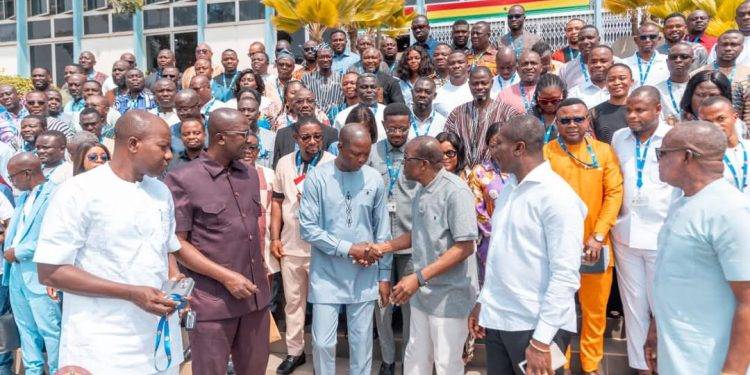Ghana’s Ninth Parliament of the Fourth Republic was inaugurated on January 7, 2025, marking a significant milestone in the country’s democratic evolution. Following the December 2024 Presidential and Parliamentary Elections, this new parliamentary term brings together a dynamic blend of experienced lawmakers and fresh faces, set to tackle the country’s pressing challenges.
This parliamentary cohort includes 115 first-time Members of Parliament (MPs), alongside 156 continuing MPs and four former lawmakers making a return to the chamber. With a total of 276 legislators, this parliament promises to introduce fresh ideas and perspectives while leveraging the experience of its seasoned members.
The Ninth Parliament’s inauguration not only signifies a continuation of Ghana’s legislative process but also highlights strides in gender representation, regional diversity, and the changing political landscape.
NDC Emerges as the Majority Party
The Ninth Parliament has seen a shift in political dominance, with the National Democratic Congress (NDC) emerging as the majority party. The NDC secured 183 seats, a decisive majority, while the New Patriotic Party (NPP) holds 88 seats. Four independent MPs complete the composition of the house.
This significant majority places the NDC in a strong position to drive its legislative agenda while presenting a challenge to the NPP to assert its role as a vibrant opposition. Observers expect this composition to bring robust debates and discussions, ensuring that national issues are thoroughly examined.
Gender Representation: Progress and Challenges
The Ninth Parliament features 40 female MPs, representing 14.5 percent of the total assembly. Among them, the NDC has 30 female lawmakers, while the NPP contributes 10. Although this marks an improvement in gender inclusion compared to previous parliaments, it also underscores the significant work that remains in achieving gender parity in Ghana’s political arena.
Advocates for women’s empowerment have called for targeted initiatives to support female political participation, including mentorship programs, public education campaigns, and reforms to reduce structural barriers. Efforts to increase gender diversity are critical for a more inclusive legislative process that reflects the voices of all Ghanaians.
Regional Representation and New MPs
The new parliament features diverse regional representation, with the Ashanti Region contributing the highest number of new MPs at 22. This is followed by the Greater Accra and Eastern Regions, each with 15 new lawmakers. Other notable contributions come from the Bono Region (7), Western Region (9), and Northern Region (8), among others.
This geographic diversity ensures that the interests of all regions are represented in the legislative process, enabling balanced policymaking. New MPs bring unique insights from their constituencies, offering innovative solutions to national issues such as economic development, education, and healthcare.
Fresh Energy and Legislative Priorities
The 115 first-time MPs are expected to inject fresh energy into parliamentary proceedings. Many of these newcomers campaigned on platforms of reform, transparency, and addressing local challenges. Their entry signals a generational shift in leadership, with younger legislators poised to champion progressive policies and leverage technology for effective governance.
Key legislative priorities for the Ninth Parliament are likely to include economic recovery, education reforms, healthcare improvements, and tackling unemployment. The parliament is also expected to address long-standing issues such as corruption, infrastructure deficits, and regional inequalities.
Returning MPs: Experience Meets Fresh Perspectives
The inclusion of four returning MPs adds a layer of expertise to the new parliament. These lawmakers bring valuable institutional knowledge and experience, which will be crucial in mentoring the first-time MPs and navigating complex legislative processes.
The synergy between seasoned legislators and newcomers presents an opportunity for robust policy debates and innovative approaches to governance. Observers are optimistic that this dynamic assembly will foster greater collaboration and accountability in addressing national challenges.
Reflections on the Inauguration
The inauguration ceremony on January 7 was a momentous occasion, attended by political leaders, diplomats, and citizens who celebrated Ghana’s democratic resilience. It underscored the country’s commitment to peaceful transitions of power and the rule of law.
Speakers at the event emphasized the importance of unity, inclusivity, and a collective effort to build a prosperous Ghana. They urged MPs to prioritize the welfare of their constituents and work together to strengthen the nation’s democratic institutions.
Gender Equality: A Call for Action
Despite the progress in female representation, the low percentage of women in parliament remains a concern. Advocacy groups have called for bold measures to encourage women’s participation in politics, including quotas, financial support, and leadership training programs.
Experts argue that a more gender-balanced parliament would result in policies that better address issues affecting women, children, and marginalized groups. The Ninth Parliament has an opportunity to champion these reforms, setting a precedent for future legislatures.
Looking Ahead
As the Ninth Parliament begins its work, the eyes of the nation are on its members to deliver on their promises and address the pressing needs of the people. From economic challenges to social development, the legislative body carries the hopes of millions of Ghanaians who seek meaningful change and progress.
The diversity, energy, and experience within this parliament offer a unique opportunity to drive transformative policies and foster national unity. Ghanaians expect their representatives to rise above partisan politics and prioritize the nation’s welfare.
The Ninth Parliament’s success will depend on its ability to build consensus, embrace innovation, and remain accountable to the people. With a strong mandate and a vibrant composition, it has the potential to leave a lasting legacy in Ghana’s democratic journey.


